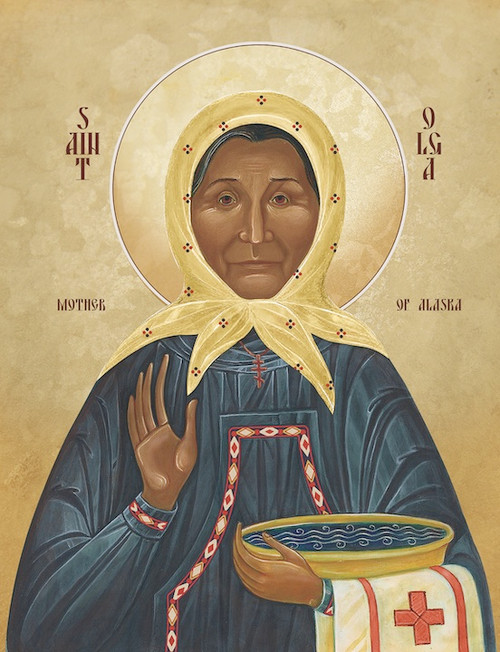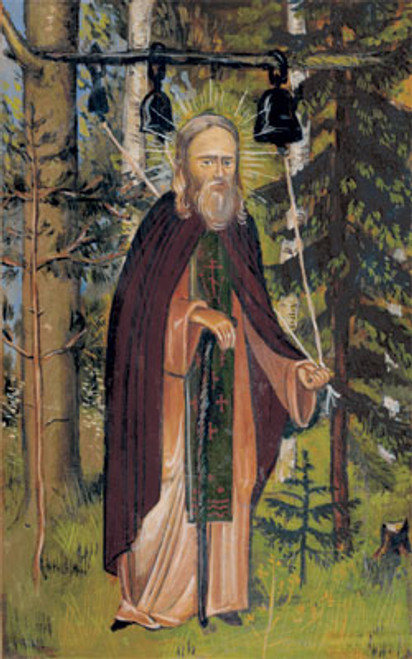On 3 February 1916, a girl named Arrsamquq was born into an indigenous Alaskan family of Yupik origin. The presence of the Russian mission in her community helped spread the faith among the local people, and she was among the first to be baptised as an infant. At baptism, she accepted the name Olga. From a very young age, she lived with the love of God. She was hard-working and prayed a lot for her family and her fellow villagers. By her teenage years, she already knew multiple liturgical texts and hymns in the church Slavonic and Yupik languages.
She married a man from her village. It was an arranged marriage. Her husband was adept at fishing and hunting. He established a general store and opened the first post office in his village. However, he was not a particularly churchly man. During the first years of their marriage, they had a troubled relationship filled with strife and arguments. But Olga did not despair. Instead, she prayed vehemently for her husband and her non-believing neighbours. Through her prayers, After a time, her husband — baptised with the name Nicolay — began to attend church. He brought six other men from the village with him. They all became readers. Nicolay Michael went on to study at so called “Aleut School”, similar to those that were founded by Saint Innocent with the support of the Russian Missionary Society, in Sitka. He studied under the direction of Bishop Amvrossy (Merejko). After graduation, he was ordained into the priesthood. From 1963, he was a priest for Kwetluk. He was the second priest in his village Kwetluk and became greatly beloved by his people. Incidentally, throughout the lifetime of Saint Olga, the great majority of the students who went this School came from her tiny village.
The couple’s married life changed significantly after Nicolai’s ordination. As a priest, Nicolai Michael travelled extensively to twelve surrounding villages to conduct services and occasional offices. Travel between the villages was done on rivers, by boat in the summer or by snow machines or dog-driven sledges in the winter. Matushka Olga, who was the only able midwife around, accompanied her husband to assist the women in childbirth and ailments. Olga gave birth to thirteen of her children without a midwife. Five of them did not survive to adulthood because of illness and a harsh climate.
Matushka Olga Michael worked hard keeping house, raising children, making vestments and baking prosphoras. Despite her busy schedule, she would also go to the homes of others to cook and clean for them. With word and deed, Olga showed people the example of Christian life according to Lord’s commandments. Not only did she help others with their housekeeping, but she also made boots, parkas, socks and mittens to distribute among the parishioners. For her acts of charity, she was nicknamed the new righteous Tabitha. She was particularly mindful of the troubled women who suffered from domestic violence. She would often ask women in her village to take a steam bath with her, where they could not hide the physical and spiritual scars of the abuse done to them. She counselled the women and said words of reassurance to each. Her compassion and sensitivity struck many as if she had lived through the same situation in her life.
As she was growing older, her daughters were assuming more of her workload. The hard-working Matushka Olga had more time to travel with her husband, help the people from the surrounding villages and teach midwifery skills to younger women.
Eventually, however, Matushka Olga began to feel weak and ill and lose weight. Her concerned family persuaded her to go to hospital. The specialists there diagnosed terminal cancer which they said was beyond treatment. Her children received the news with much grief and prayed vehemently at the local holy places. As for the Matushka, was not resigned to her bed rest. While her daughters were away, she continued to go outside, hauling buckets of water from the village well.
In the last days of her life, she prayed a lot and left her last instructions to her family in preparation for her peaceful repose. On 8 November 1979, she partook of the Holy Sacraments, crossed herself and departed peacefully to God. She was buried in her wedding gown, which she had kept throughout her life.
Her death coincided with the feast day of Archangel Michael (the Old Calendar) whom she revered. The people from her village remembered her standing under the icon of Archangel Michael at church.







